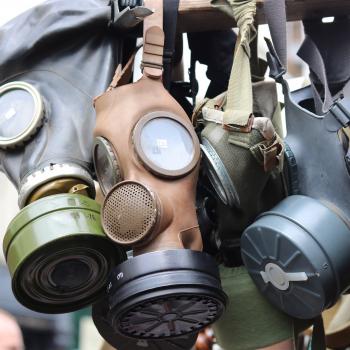Just wanted to preface that I’ve been following your blog “Love, Joy, Feminism” for a while. While I did not grow up quiverfull, I did grow up in a fairly conservative evangelical church. I left Christianity in college after an experience with abuse and domestic violence blasted my views apart. I’ve come to appreciate your writing as a good expression of what many of us experienced growing up as young women in the conservative movement.
Like most in that type of church, I was taught that all non-christians were going to hell – with Christianity of course being narrowly defined as agreeing with the church. While I of course no longer believe in heaven or hell, I still find myself afraid of it. I was talking to a friend recently – a liberal christian and a universalist – who revealed similar fears. This seems to be fairly common among those of us who grew up in that type of culture. My question is, did you have to deal with this fear of going to hell when you left Christianity? If so, how did you handle it?
To understand where this question comes from, you have to understand exactly what Jese and I were taught about hell. Many of my readers come from similar backgrounds and understand, but for those of you raised in liberal religious traditions or outside of religion entirely, I’ll start by explaining.
Heaven, Hell, and Salvation
We were taught, first and foremost, that heaven and hell are very real places. Every person, when they die, will go to either heaven or hell (there is no purgatory or in-between place in this schema). Only those who have trusted Jesus for their salvation will go to heaven; all others, no matter how good or earnest, will go to hell. In heaven, souls spend eternity praising God and living in the city of gold and jewels he has built for them. In hell, souls spend eternity being tortured in a lake of fire.
I, and others raised similarly, was taught that the only way to be saved is to acknowledge that you are a sinner and cannot achieve heaven on your own but will always fall short, and then to trust that Jesus’ death on the cross will pay for your sins, thus accepting God’s gift of salvation. I have written before about salvation anxiety, because while this sounds simple and easy it really isn’t. While salvation comes from the acknowledgement I mentioned below, as embodied in the “sinner’s prayer,” you have to actually mean it. If you have any pride in your own abilities or righteousness, the whole thing is negated. The result is that many (not all) young Christians, like me, pray the sinner’s prayer again and again over the years, afraid that maybe they hadn’t really meant it the first time.
If you don’t pray the sinner’s prayer, you will go to hell. It’s as simple as that. And you can’t pray the sinner’s prayer unless you have heard of Jesus (See Romans 10:14-15), so everyone who never hears the gospel message will go to hell, as will anyone who hears and rejects it. It doesn’t matter how good someone is, how loving or caring, if they haven’t prayed the sinner’s prayer – and meant it – they will go to hell. Ethical atheists, well-meaning liberal Christians, compassionate and loving Muslims, all will go to hell.
Just what is hell? Hell is not a very popular idea these days. Some fundamentalists and evangelicals, along with many in more liberal Christian traditions, define hell as simply “separation from God” in an attempt to downplay it. But in churches like the one in which I grew up, the “separation from God” line is never evoked alone. Hell may be separation from God, but it’s also a physical place of eternal torture and fire. There are many Bible verses ready to confirm this.
Matthew 13:49-50 – It will be this way at the end of the age. Angels will come and separate the evil from the righteous and throw them into the fiery furnace, where there will be weeping and gnashing of teeth.
Mark 9:47-48 – It is better to enter into the kingdom of God with one eye than to have two eyes and be thrown into hell, where their worm never dies and the fire is never quenched.
Revelation 14:9-11 – A third angel followed the first two, declaring in a loud voice: “If anyone worships the beast and his image, and takes the mark on his forehead or his hand, that person will also drink of the wine of God’s anger that has been mixed undiluted in the cup of his wrath, and he will be tortured with fire and sulfur in front of the holy angels and in front of the Lamb. And the smoke from their torture will go up forever and ever, and those who worship the beast and his image will have no rest day or night, along with anyone who receives the mark of his name.”
Yes, I know there are Christians today who don’t believe in hell, or at least don’t believe hell is permanent or that it is a place of torture. My point is not to get in an argument over what the Bible does or does not say about hell, but rather to point out that there are a myriad of verses that seem to indicate that hell is a place of horrendous and eternal torture, and that many evangelicals and fundamentalists take these verses very seriously and many evangelical and fundamentalist children grow up with this understanding of hell.
This I and many others like me grew up believing that if I did not pray the sinner’s prayer, and mean it, I would be tortured for eternity, with no end. This torture, I was taught, would only be what I deserved for being a sinner and not accepting God’s gift of salvation through the death of his son on the cross.
The Fear of Hell Part 1: Losing My Faith
When I first started questioning the basic tenets of Christianity and even looking beyond religion itself, I was very, very afraid. I felt that no matter how much Christianity did not make sense to me, I had better stick with it than risk the eternal torture in hell. I knew Pascal’s Wager well, and felt it was a wager I must make. I had to hold onto my faith, whatever it took, because I could not, would not risk eternal torture.
The problem was that I knew that faith had to be real, and I had precious little of that left. How could I affirm the credo of the sinner’s prayer with sincerity when I was having serious doubts about every little part of Christianity? I knew that God could see through a fake confession. I realized that more and more when I affirmed the tenets of Christianity I was simply paying lip service to things I didn’t really believe anymore. And so I stopped.
My growing atheism immediately helped to erode my fear of hell. If there was no God, there was no hell. As I became more and more sure that there was no God out there, and as I found more and more evidence that pointed toward a lack of God’s existence, my fear of hell was able to dissipate. As an atheist, after all, I was now fairly certain that there was no God, no heaven, no hell. And yet. There was still a little bit of me that was afraid, afraid that maybe somehow I was wrong and hell as I was taught really did exist, in which case I would of course end up there and be tortured for all eternity. My fear of hell had lessened, but it had not disappeared.
The Fear of Hell Part 2: The Lessons of Logic
I had been taught that people went to hell after death not because God sent them there, but rather because, without Jesus’ blood, they deserved it because of their sinfulness. But this all made less and less sense to me.
Why would God set it up so that his son’s sacrifice only paid for those who happened to hear about it and believe in it, rather than for everyone? Why would God privilege belief over things like love, compassion, and ethical living? How was eternal torture a just punishment for any evil deed a human could carry out?
There are several counter arguments to all of this. The first is that God couldn’t change the rules that he had to live by, and these were somehow the rules. He couldn’t “set up the system” any other way, this was the way it had to be, as much as it grieved him. The second is that God may be merciful, but he is also just, and justice demands the eternal torture of those who do not repent of their sins. This does not negate God’s love. The picture I was given growing up was almost one of God weeping as sinful people willfully consign themselves to hell.
But then I realized something. If I were told that if I had children, fifty percent of them would have a horrible nerve system condition that would result in them feeling excruciating pain for their entire lives, with no way to give them any sort of relief, I wouldn’t have children. I realized that God had to be horribly sadistic to create mankind knowing what would happen, knowing of the eternal torture of billions of souls, just so that he could have the company of the ones who admitted they were sinners and bowed before his son. No matter how bound God was by whatever rules he was bound by, there was no excuse for this.
I also realized that eternal torture for finite sins is absolutely not just. If my cat scratched me several times in one day, would I be justified in cutting the tip of his tail off as a punishment, or in sticking pins in him as a punishment? If Sally began making destructive messes, throwing her toys all over and pulling books off the bookshelves even when I asked her to stop, would I be justified in tying her down and beating her? NO. The punishment is supposed to fit the crime, and eternal torture as a punishment for something that is part of human nature (because, as descendants of Adam, all humans supposedly have a sin nature) is sort of like using an atom bomb in response to someone stealing a stick of gum. Except worse, because eternal torture never ends.
I suddenly realized that, in the words of one of my readers, if this was God, I was more ethical than he was. I realized that if the God I had been taught existed actually did exist, if a hell of eternal torture awaited all who did not bow before him, he wasn’t worth serving. He was an evil, cruel, malignant sadist worse even than Hitler. It was at this point that I formulated “Libby Anne’s Wager.”
The Fear of Hell Part 3: The Salvation War
Yet I knew that there technically could be an evil, sadistic God, however unlikely it was. I could say all I wanted that I wouldn’t serve a God like that, but that didn’t automatically mean that he did not exist, though I seriously, seriously doubted it. In other words, just a smidgen of my fear of hell survived all these questions and musings. And then I read The Salvation War. Yes yes, laugh, because it is ridiculous, but reading this book-length internet fan fiction killed the last bits of my fear of hell. The premise of the Salvation War is as follows:
The story follows an alt-universe story wherein heaven and hell are real, and heaven declares that, from now on, all humans who die will go to hell, and orders all humans to lie down and die. Satan consequently declares Earth a conquest; however, the surviving humans will not go under lightly and declare war on hell. The story explores themes of betrayal, self-reliance, and especially the dichotomy between inflexible dogmatic thinking and flexible scientific analysis.
I know this sounds silly, but the moment the first B52 bombers blew up the first demon scouts – “Just what the hell are those?” – I felt liberated in a way that’s hard to describe. The moment a seasoned female marine was killed in combat and found herself in hell, only to take up arms there and start a rebellion within hell itself, I felt something give inside of me as the last bit of my fear of hell took flight. The Salvation War is the story of ethical, compassionate, brave people waging literal war against an evil, backward, narcissistic, cruel God and his companion, Satan. And I don’t want to give away the end, but let’s just say it doesn’t turn out so well for God.
Now, I know that this story is fiction, and I grew up being taught that demons are somehow in another dimension and couldn’t be killed by B52 bombers. But somehow, reading The Salvation War spoke to something deep within me, reminding me that if there is such a God, we are greater than it, and maybe, just perhaps, if there was such a God we could, together, do something about it.
If your curiosity is piqued and you want to have a look at The Salvation War, you can read the whole thing here, but I’ll warn you – it’s long. Oh, and there’s some profanity, and the people who wrote it are very into science and technical things, so there’s some detail about weapons systems, etc. But it was food for my hell-fearing heart.
Conclusion
I have indeed dealt with the fear of hell, and I have overcome it. For me, it took both logically realizing that a God who would allow the existence of hell as we were taught is a sadistic bully, and reading literature that allowed me to see the defeat of just such a God at the hands of ethical and united human beings. Best wishes to you on your own journey, and I’d like to invite anyone else who has had similar fears to share how they have dealt with them.













